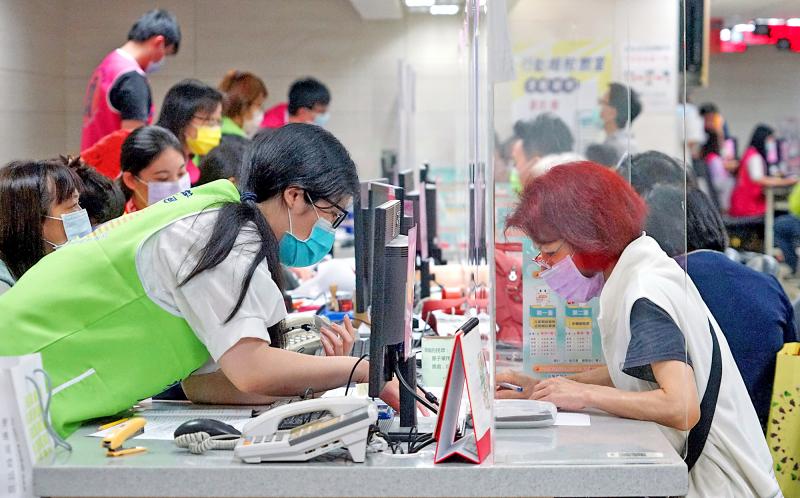The national treasury last month collected NT$132.7 billion (US$4.75 billion) in tax revenue, an increase of 11.4 percent from a year earlier, bolstered mainly by sharp increases in securities and property transactions, the Ministry of Finance said yesterday.
Securities transactions generated a record NT$24.4 billion in tax revenue, rising 1.6 times from a year earlier, as daily turnover on the Taiwan Stock Exchange and the Taipei Exchange expanded almost threefold to a new high of NT$526.9 billion, Department of Statistics Deputy Director-General Chen Yu-feng (陳玉豐) told a news conference in Taipei.
Securities transaction tax revenue has increased for 19 consecutive months, the third-longest streak of gains, trailing only 21 months from 1996 to 1997 and 22 months from 1988 to 1990, Chen said.

Photo: CNA
The figure might climb higher this month based on daily trading volumes so far.
Market turnover yesterday surged to a record NT$714.835 billion, even though COVID-19 pandemic selloffs pushed the TAIEX down 652.48 points to 16,583.13.
For the first four months of this year, securities transaction tax revenue more than doubled from the same period last year to NT$80.4 billion, the ministry’s monthly report showed.
Land value increment tax revenue contributed NT$8.4 billion to the state chest, representing an annual increase of 12.1 percent, as the number of taxable cases swelled 23.6 percent to 57,510, it said.
A total of 226,643 deals subject to property gains taxes were recorded from January to last month, an increase of 21.1 percent from a year earlier, the ministry said.
Inheritance and gift tax revenue last month rose 63.6 percent to NT$3.9 billion, while sales tax revenue grew 11.5 percent to NT$16 billion, it said.
By contrast, personal income tax revenue shrank 2.4 percent to NT$28.6 billion, while corporate income tax revenue slid into negative territory due to tax returns, Chen said.
Tax revenue in the first four months of this year increased 15.5 percent year-on-year to NT$599.9 billion, beating the ministry’s forecast by 16.6 percent and covering 24.6 percent of the government budget for this year, the report said.

With this year’s Semicon Taiwan trade show set to kick off on Wednesday, market attention has turned to the mass production of advanced packaging technologies and capacity expansion in Taiwan and the US. With traditional scaling reaching physical limits, heterogeneous integration and packaging technologies have emerged as key solutions. Surging demand for artificial intelligence (AI), high-performance computing (HPC) and high-bandwidth memory (HBM) chips has put technologies such as chip-on-wafer-on-substrate (CoWoS), integrated fan-out (InFO), system on integrated chips (SoIC), 3D IC and fan-out panel-level packaging (FOPLP) at the center of semiconductor innovation, making them a major focus at this year’s trade show, according

DEBUT: The trade show is to feature 17 national pavilions, a new high for the event, including from Canada, Costa Rica, Lithuania, Sweden and Vietnam for the first time The Semicon Taiwan trade show, which opens on Wednesday, is expected to see a new high in the number of exhibitors and visitors from around the world, said its organizer, SEMI, which has described the annual event as the “Olympics of the semiconductor industry.” SEMI, which represents companies in the electronics manufacturing and design supply chain, and touts the annual exhibition as the most influential semiconductor trade show in the world, said more than 1,200 enterprises from 56 countries are to showcase their innovations across more than 4,100 booths, and that the event could attract 100,000 visitors. This year’s event features 17

SEMICONDUCTOR SERVICES: A company executive said that Taiwanese firms must think about how to participate in global supply chains and lift their competitiveness Taiwan Semiconductor Manufacturing Co (TSMC, 台積電) yesterday said it expects to launch its first multifunctional service center in Pingtung County in the middle of 2027, in a bid to foster a resilient high-tech facility construction ecosystem. TSMC broached the idea of creating a center two or three years ago when it started building new manufacturing capacity in the US and Japan, the company said. The center, dubbed an “ecosystem park,” would assist local manufacturing facility construction partners to upgrade their capabilities and secure more deals from other global chipmakers such as Intel Corp, Micron Technology Inc and Infineon Technologies AG, TSMC said. It

EXPORT GROWTH: The AI boom has shortened chip cycles to just one year, putting pressure on chipmakers to accelerate development and expand packaging capacity Developing a localized supply chain for advanced packaging equipment is critical for keeping pace with customers’ increasingly shrinking time-to-market cycles for new artificial intelligence (AI) chips, Taiwan Semiconductor Manufacturing Co (TSMC, 台積電) said yesterday. Spurred on by the AI revolution, customers are accelerating product upgrades to nearly every year, compared with the two to three-year development cadence in the past, TSMC vice president of advanced packaging technology and service Jun He (何軍) said at a 3D IC Global Summit organized by SEMI in Taipei. These shortened cycles put heavy pressure on chipmakers, as the entire process — from chip design to mass